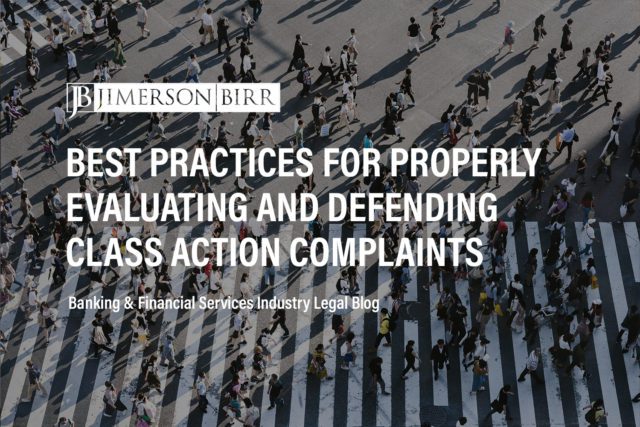What does recovering from third parties in class action defense entail?
Recovering from third parties through third-party practice in class action defense involves the defendant in a class action lawsuit seeking contribution or indemnification from a third party who may be partly or wholly responsible for the alleged harm. In the context of class action litigation defense, the defendant may bring a separate claim against another party (the third party) who may be liable for some or all of the damages claimed by the plaintiffs. The objective is to mitigate the defendant’s financial burden in the event of an unfavorable judgment.
For example, a defendant in a product liability class action might seek a contribution from a third-party manufacturer or supplier whose product contributed to the plaintiff’s injuries. Suppose the manufacturer or supplier is partially or fully liable for the plaintiffs’ injuries due to a proven defect in their product. In that case, the defendant may recover some of the damages paid to the plaintiffs from the third-party manufacturer or supplier, effectively reducing their liability.
Need help to defend against a class action lawsuit? Schedule your consultation today with a top class action defense attorney.
Which Florida and federal laws and regulations apply to recovering from third parties in a class action?
In Florida, the primary law relating to recovering from third parties through third-party practice in class action defense is found in the Florida Rules of Civil Procedure, specifically Rule 1.180, which governs third-party practice. After serving their original answer, this rule allows a defending party to bring in a third party who may be liable to the defendant for all or part of the plaintiff’s claim.
Additionally, Florida Statutes § 768.31, known as the “Uniform Contribution Among Tortfeasors Act,” may apply in cases where multiple parties are found to be at fault. This statute provides a right of contribution among joint tortfeasors, allowing a defendant to recover a portion of the damages paid to the plaintiff from a third party at fault. Finally, in some cases, federal laws and regulations may also apply, depending on the nature of the class action and the case’s specific circumstances.
What are the strategic benefits of recovering from third parties in class action defense litigation?
Recovering from third parties through third-party practice in class action litigation matters offers the following strategic benefits:
- Risk mitigation: By pursuing recovery from third parties who may share liability for the plaintiff’s injuries, defendants can potentially minimize their liability exposure. This strategy can be beneficial in Florida, where joint and several liability has been abolished, and defendants can only be held responsible for their percentage of fault.
- Cost and resource optimization: By including third parties in the litigation process, defendants may be able to spread the financial burden of defending the lawsuit and the costs of any potential settlement or judgment. In addition, bringing in third parties can lead to a more efficient discovery process, as all relevant parties will have the opportunity to share information.
- Strengthening defense: Involving third parties can create additional opportunities for the defendant to challenge the plaintiff’s claims. For example, a defendant may argue that the third party’s product or conduct was the primary cause of the plaintiff’s injuries rather than their product or actions.
- Encouraging settlement: The presence of third parties in a class action lawsuit can create additional pressure on the plaintiff to settle, as they may face the prospect of having to litigate against multiple well-funded defendants. Furthermore, a successful third-party claim may increase the overall settlement amount available to the plaintiff, making it more attractive for them to resolve.
- Enhancing credibility: By demonstrating that they have thoroughly investigated all potential sources of liability, defendants can increase their credibility in the eyes of the court and the plaintiff’s legal team.
What steps should a class action defendant take to recover from third parties?
Class action defendants should follow these steps:
- Identify potential third parties: Analyze the facts and circumstances of the case to identify third parties who may share liability for the plaintiff’s alleged injuries. This process may involve reviewing contracts, industry practices, and relationships between parties.
- Assess the legal basis for third-party claims: Evaluate whether the applicable Florida and federal laws allow for third-party claims in the specific context of the case.
- File third-party complaints: Draft and file third-party complaints per the applicable rules of civil procedure, ensuring that the pleadings contain all necessary elements to state a claim for relief against the third parties.
- Engage in discovery: Participate in discovery with both the plaintiff and third parties, seeking information and evidence relevant to the liability of the third parties and the potential for recovery.
- Pursue settlement or trial: Attempt to resolve third-party claims through negotiation or mediation or proceed to trial if necessary.
Defenses against recovering from third parties in class actions include the following:
- Statute of limitations: The third-party claim may be time-barred if not filed within the applicable statute of limitations period.
- Lack of standing: The defendant may not have standing to assert the third party claim if they cannot demonstrate a legally protected interest injured by the third party’s conduct.
- Failure to state a claim: The third-party complaint may face dismissal if it fails to state a claim upon which relief can be granted, meaning that the defendant has not sufficiently alleged the elements of the claim.
When a set of facts is appropriate to meet the requirements of third-party practice, there are many paths a claimant may take. We are value-based attorneys at Jimerson Birr, which means we look at each action with our clients from the point of view of costs and benefits while reducing liability. Then, based on our client’s objectives, we chart a path to seek appropriate remedies.
To determine whether a unique situation may necessitate litigation, please contact our office to set up your initial consultation.
Frequently Asked Questions
- Can a defendant in a class action lawsuit always bring third-party claims against other parties?
No, the defendant’s ability to bring third-party claims depends on the specific facts and circumstances of the case, as well as the applicable Florida and federal laws. Defendants should consult with legal counsel to determine the viability of third-party claims in their case.
2. How does Florida’s pure comparative fault system impact third-party practice in class action defense?
Under Florida’s pure comparative fault system (Florida Statutes §768.81), a defendant’s recovery from a third party will reduce by the percentage of fault attributable to the defendant; this means that if the defendant is more at fault than the third party, their recovery from the third party may be limited or eliminated.
3. Do third-party claims always need to be resolved as part of the class action litigation?
Not necessarily. Third-party claims may sometimes resolve separately through negotiation, mediation, or litigation. However, in some cases, resolving third-party claims as part of class action litigation may be more efficient and cost-effective for all parties involved.
Have more questions about a class action defense-related situation?
Crucially, this overview of recovering from third parties in class action defense does not begin to cover all the laws implicated by this issue or the factors that may compel the application of such laws. Every case is unique, and the laws can produce different outcomes depending on the individual circumstances.
Jimerson Birr attorneys guide our clients to help make informed decisions while ensuring their rights are respected and protected. Our lawyers are highly trained and experienced in the nuances of the law, so they can accurately interpret statutes and case law and holistically prepare individuals or companies for their legal endeavors. Through this intense personal investment and advocacy, our lawyers will help resolve the issue’s complicated legal problems efficiently and effectively.
Having a Jimerson Birr attorney on your side means securing a team of seasoned, multi-dimensional, cross-functional legal professionals. Whether it is a transaction, an operational issue, a regulatory challenge, or a contested legal predicament that may require court intervention, we remain a tireless advocate every step of the way. Being a value-added law firm means putting the client at the forefront of everything we do. We use our experience to help our clients navigate even the most complex problems and come out the other side triumphant.
If you want to understand your case, the merits of your claim or defense, potential monetary awards, or the amount of exposure you face, you should speak with a qualified Jimerson Birr lawyer. Our experienced team of attorneys is here to help. Call Jimerson Birr at (904) 389-0050 or use the contact form to schedule a consultation.

We live by our 7 Superior Service Commitments
- Conferring Client-Defined Value
- Efficient and Cost-Effective
- Accessibility
- Delivering an Experience While Delivering Results
- Meaningful and Enduring Partnership
- Exceptional Communication Based Upon Listening
- Accountability to Goals










